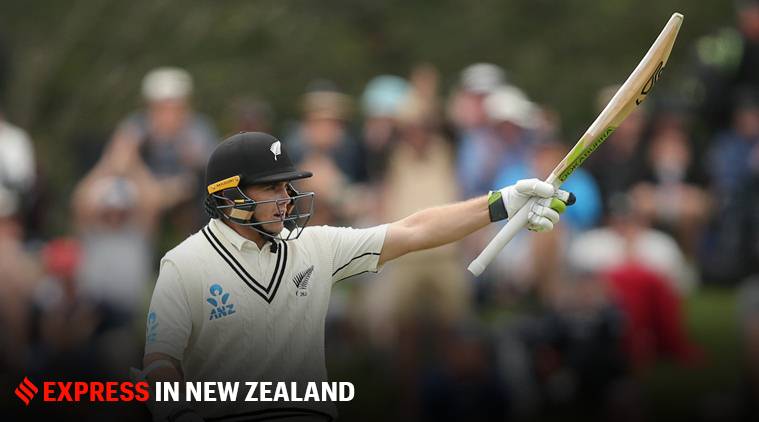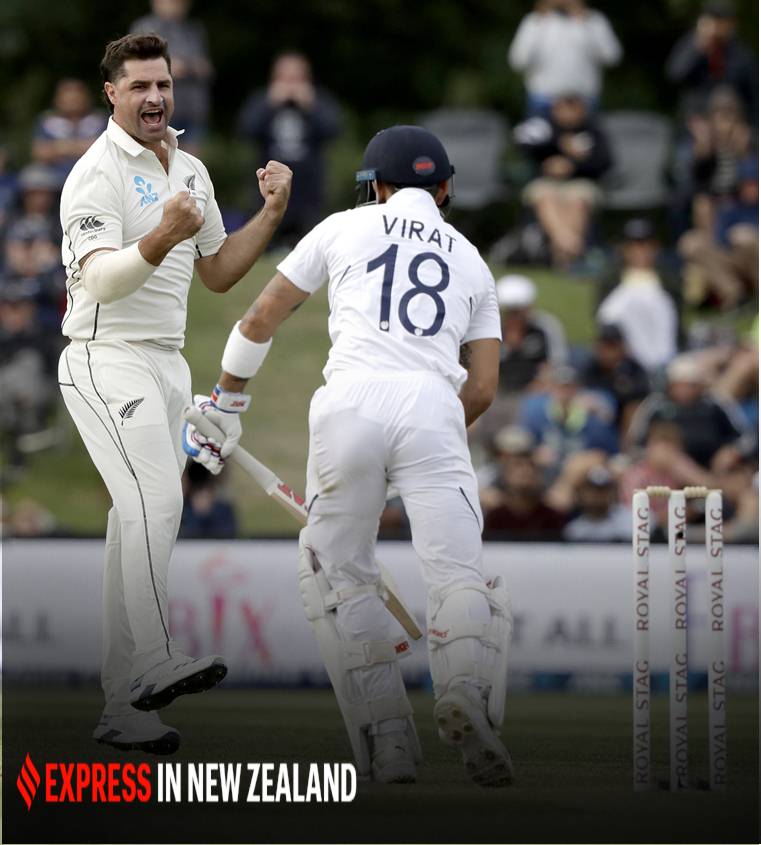 Tom Latham celebrates his half-century against India in second Test. (REUTERS)
Tom Latham celebrates his half-century against India in second Test. (REUTERS)
Best supporting cast
Tom Latham was barely 15 when he walked out to face the fastest-ever New Zealand bowler, Shane Bond, in a club game. By then Bond had lost much of his frightening pace, but Latham’s club coach Neil Fletcher was hesitant to send him as an opener. So before the game started, he told the teenager to bat down the order. But the fresh-faced Latham – he retains the freshness even now – didn’t flinch.
“Don’t worry coach, one day or the other I have to face bowlers as fast as him,” he told him. The coach was still reluctant, before Tom’s father Rod, a former international opener himself, assured him: “Let’s see if he’s got the stuff… If he’s not good enough, maybe, he needs to rethink his future.”
A few minutes later, Latham was shadow-batting in the middle, stretching his limbs and crouching to get the blood flowing. As Bond and Co. entered the field, one of the fielders began sledging him. Remembers Fletcher: “Something like, have you carried enough nappies or do you have a feeding bottle, some silly stuff. But Tom hardly listened to all this rubbish. He was just waiting for the biggest moment of his life. He even snatched the strike from his senior partner.”
The first ball was full and beat his forward defensive. The second was back of a length, and he hung back and defended: “The perfect back-foot defensive,” Fletcher gushes. The third ball was full and straight. “He just extended his bat and pushed it straight back. Four runs. I thought well, he’s a seriously tough bloke. Has the guts,” Fletcher says.
Latham finished the match 92 not out, replete with several straight drives and pull shots, and a wowed Bond gave him an autographed ball. He then had a chat with Rod. “Brave lad, I’m sure he will be a Black Cap like you.” In fact, an upgrade on his father, who was a bit-part player in the strictest sense.
Twelve years on, Latham has not only materialised Bond’s prophesy, but also emerged as an indispensable cog in Kane Williamson’s resurgent side. His credentials — 3,726 runs at 42.34 in 52 Tests — are among the finest among contemporary openers at a time when there’s a noticeable shortage of quality in that role. Yet, he slips into anonymity. There is no flash about him like Ross Taylor, or the aura of Kane Williamson. His stroke-play neither awes nor thrills, not ungainly but not eye-catching either. He compiles his runs through drives down the ground, feisty pulls, nudges, clips and glides. The team is not built around him, yet he’s one of the stubborn blocks that make this team.
He scored just 122 runs in the Test series against India, but take out the pair of 52s he made on a tacky Christchurch surface, and the story of the match could have been different. He saw through tricky spells from Jasprit Bumrah and Mohammed Shami, shrugged of the instances the ball beat him and hung around weathering the storm and punishing the loose balls.
Fletcher is not surprised. “He’s always had a great understanding of the game. Nothing fazes him. Every level he goes up, he seems to take it in his stride. He’s quite a humble person and a very good team man; the guys in club and school really looked up to him and he just lets his bat do the talking,” he observes.
The Williamson cheer-group, Steady The Ship, gave him a nickname, Dave Franco after the Hollywood actor, who they feel Latham resembles. Also like Franco, Latham is the support actor whose work goes under-appreciated. Not at home though. “Sometimes, he tells me ‘dad shut up, I’ve got more runs than you,’ as a joke. But I tell him, ‘still you couldn’t play my wobblies’,” says his father.
Though Latham’s father was an opener and a part-time medium pacer, he didn’t thrust cricket on him. “It just happened. So after retiring from international cricket, I began working at a sports shop in Christchurch and when he was around 4-5, my employer presented Tom with a cut-down cricket bat. I was surprised he picked it up left-handed. He had the left-hander’s cow corner slog fairly early on. It wasn’t too cultural at the start,” Rod says. A refined version of the slog sweep he unfurls in the subcontinent, where he has enjoyed considerable success, hundreds in Abu Dhabi and Colombo, besides half-centuries in India.
Latham senior was careful not to interfere in his coaching. “Being the son of a former player is always difficult and the expectation is more than most. So I’ve always stayed in the background and his coaches are his coaches. He comes to me every now and then and asks what I think. I’ll give him my thoughts and he’ll do what he needs to do. I’ve always stayed at arm’s length and let him make his own way in sport,” he says.
When he’s not playing cricket, Latham tags along with his father to the Harewood Golf Club. Apart from bowling, it’s the only spectrum where the father dominates the son. “He’s a decent player, but will take sometime before he reaches my level,” the father chuckles. Jokes aside, he says: “As a cricketer, he has far exceeded my achievements and there are many more years left in his career. He has achieved what I could not have even dreamt of,” he says.
Fletcher too is assured of his greatness. “He’s too good, the world will one day understand him fully.” But Latham’s hardly bothered of recognition or accolades. He’s content, like the archetypal Kiwi batsmen, to slink into the background and quietly complete his shifts. More John Wright, his father’s opening ally, than Martin Crowe, his father’s captain. The Dave Franco of the team.
Big man, shy man
In a rare trip to the city of his birth in 2005, former Zimbabwe cricketer Paul Strang, who had by then migrated to New Zealand and begun coaching at a club in Auckland, stumbled upon a robust-built teenager at the Harare Cricket Club. He knew how difficult it was back then for a white cricketer to burst into the national team. So he queried him whether he was interested in shifting to Auckland.
First, he had to convince the boy’s father, who aspired for his son to don Zimbabwe colours. Over a few meetings, he succeeded and Colin de Grandhomme was on his maiden flight. “I was very scared. I was flying for the first time and to a distant place,” he once told New Zealand Herald.
 Colin de Grandhomme celebrates after dismissing Virat Kohli on Day 2 of the second Test between New Zealand and India in Christchurch. (AP Photo)
Colin de Grandhomme celebrates after dismissing Virat Kohli on Day 2 of the second Test between New Zealand and India in Christchurch. (AP Photo)Strang was struck by the big man’s shyness. So was his then club coach Dipak Patel when he first met him. “He was a quiet, shy boy who hardly spoke. But he was bloody hardworking, rarely went out drinking with the boys, and ready to do anything for the team,” he recollects.
It’s what he does for his team as well. Plugging in relentlessly with the ball as a reliable stock bowler and chiming in with useful contributions down the order. His clean hitting has made him a cult hero on the county circuit, where he plays for Warwickshire, though in the New Zealand set-up, his role as a batsman is more akin to Ravindra Jadeja’s.
In another era, or another team, he would have been labelled as the conventional Black Cap all-rounder, a bit-part player, who wouldn’t have merited a placed on singular skill in a Test XI.
De Grandhomme bowls what might be described as right-arm Kiwi orthodox, medium-pace wobble. But underestimate him at your peril. On his Test debut, he picked six for 41 against Pakistan in Christchurch, the first Black Caps debutant to take half-a-dozen wickets since Alex Moir took six for 155 against England way back in 1951.
A few months later, he smacked his maiden — and till date only — Test hundred against West Indies in Hamilton. Twenty-four games into his career, he averages 37 with the bat including that hundred and eight 50s. He has picked just 37 wickets at 31.13.
Modest numbers, but his utility could not be gauged through numbers. For instance, in this series, his 43 in the first innings in Wellington and 26 in the first innings in Christchurch turned out to be precious for his team. Add to that the wicket of Virat Kohli in the second innings of the Christchurch Test, his workmanlike figures of 16-5-28-1, 11-5-12-1, 9-2-31-0 and 5-3-3-1, and his contributions have been as spectacular as their frontline bowlers.
Explained Trent Boult: “His thrift gives bowlers the freedom to attack. His energy gives us the time to recover between spells. He’s like a bowling machine.” Take him out of the eleven, and the Kiwis becomes an incomplete force.
However, he still remains shy and elusive. His rationale, as he explained to a radio station in a rare interview: “Just never been my thing. Talking in front of a crowd and just talking in front of heaps of people is pretty tough for me. I would rather face a 150kmh pacer,” he says. Then in a rare instance of humour, he says: My dictionary doesn’t have as many words as other people.”
Among Kiwi journos, he’s known as the five-word Colin. For there was a press conference — in fact, the only one he has ever give — wherein he spoke just five words. But his all-round efforts speak more than the words. And his teammates are often at a loss of words when talking about him.
However, there’s no shortage of nicknames. Dutchie for his Dutch accent, Mo-man for the thick moustache he spotted on debut before he shaved it before the World Cup, Magnum for his striking resemblance to Tom Selleck’s famous character Thomas Magnum from Magnum P.I. Then Big House, because his New Zealand teammates thought his French surname Grandhomme meant Big House, whereas it actually means Big Man. But Grandhomme hasn’t cared much about correcting names, or changing perceptions.